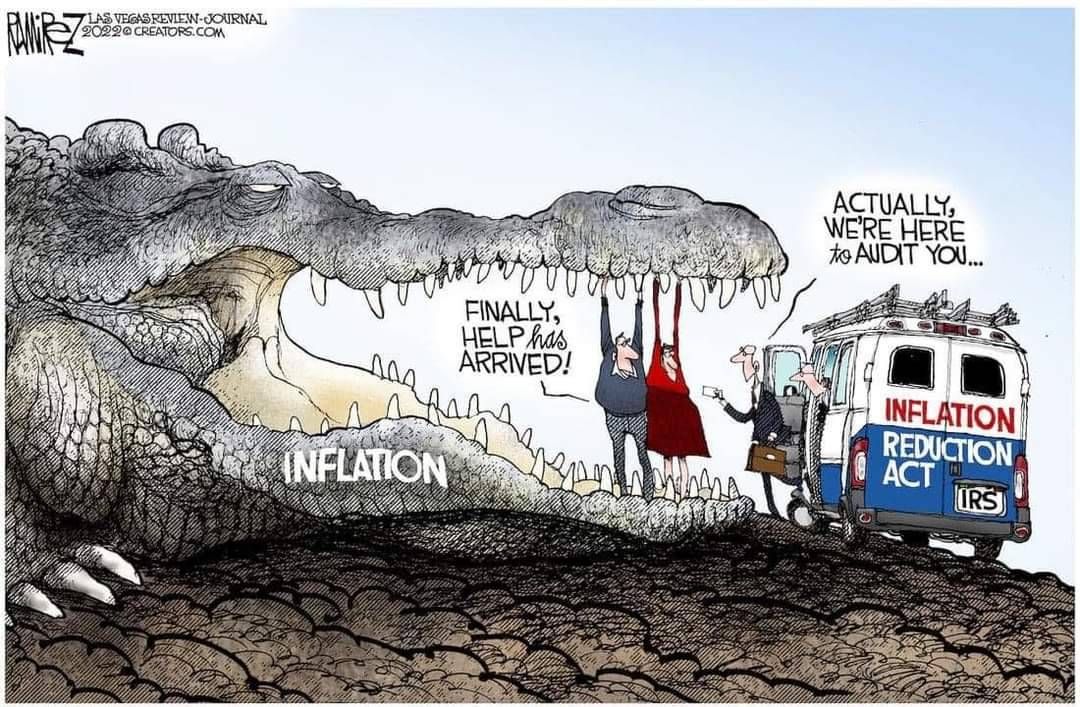Inflation Reduction Act
-
Probably will not reduce inflation...
BTW, the bill passed without a single GOP vote, Senate or House!
-
From the linked article:
… a letter signed by more than 120 economists, including several Novel Prize winners and former Treasury secretaries, that asserts that the law’s reduction in the government’s budget deficit — by an estimated $300 billion over the next decade, according to the CBO — would put “downward pressure on inflation.”
Even without acknowledging the “inflation reduction” aspect of it, you can still apprecaite the budget deficit reduction, right?
You still like deficit reduction, right? Or do you no longer like deficit reduction since Trump and the GOP‘s passed the 2017 tax reform that adds $1.5 Trillion to the deficit?
-
Here's what Wharton said:
Key Points
PWBM estimates that the Senate-Passed Inflation Reduction Act, as written, would reduce cumulative deficits by $264 billion over the 10-year budget window.
The Act would have no meaningful effect on inflation in the near term but would reduce inflation by around 0.1 percentage points by the middle of the first decade. These point estimates, however, are not statistically different from zero, indicating a low level of confidence that the legislation would have any measurable impact on inflation.
Relative to current law, the Act would slightly reduce GDP in the first decade while slightly increasing GDP by 2050. These estimates include the impact of debt reduction, carbon reduction, and tax incentives on investments and working hours.
Most, but not all, of the tax increases fall on higher income households. However, future generations, including higher-income households, gain from the improved economy, including a reduction in carbon emissions.
-
Here's what Wharton said:
Key Points
PWBM estimates that the Senate-Passed Inflation Reduction Act, as written, would reduce cumulative deficits by $264 billion over the 10-year budget window.
The Act would have no meaningful effect on inflation in the near term but would reduce inflation by around 0.1 percentage points by the middle of the first decade. These point estimates, however, are not statistically different from zero, indicating a low level of confidence that the legislation would have any measurable impact on inflation.
Relative to current law, the Act would slightly reduce GDP in the first decade while slightly increasing GDP by 2050. These estimates include the impact of debt reduction, carbon reduction, and tax incentives on investments and working hours.
Most, but not all, of the tax increases fall on higher income households. However, future generations, including higher-income households, gain from the improved economy, including a reduction in carbon emissions.
For comparison, Wharton said the following concerning the 2017 tax reform:
Key Points
-
By 2027, under our standard economics assumptions, we project that GDP is between 0.6 percent and 1.1 percent larger, relative to no tax changes. Debt increases between $1.9 trillion and $2.2 trillion, inclusive of economic growth.
-
By 2040, we project that GDP is between 0.7 percent and 1.6 percent larger under our baseline assumptions, and debt increases by $2.2 to $3.5 trillion.
The Inflation Reduction Act will be more fiscally responsible than the 2017 tax reform, significantly.
-
-
-
Just so I understand correctly - the inflation figures that are given out every month are based on a 12 month"cumulative amount", to get a yearly change, correct?
So, in order for the US inflation rate to go from, for example, 9.!% in June --> 8.5% in July --> 8.3% in August, there is actually slight "deflation"?
-

Green Tax Credits Are Likely to Be More Popular—and Expensive—Than Expected
But the tax-credit boom could undermine another administration talking point about the law: The claim that it will reduce long-run budget deficits. The Goldman and Brookings analyses contend that the tax credits could cost American taxpayers three times as much as the $271 billion forecast when Congress passed the law. The OMB figure points in the same direction, though its estimates about revenue from tougher tax enforcement—which are larger than congressional projections—turn the law from deficit-increasing to deficit-reducing.
“It’s extraordinarily more expensive than was forecast,” said Donald Schneider, a former House GOP aide who is now deputy head of U.S. policy at Piper Sandler. “This puts a huge target on the back of these credits.”
"Extraordinarily more expensive than forecast."
-

Green Tax Credits Are Likely to Be More Popular—and Expensive—Than Expected
But the tax-credit boom could undermine another administration talking point about the law: The claim that it will reduce long-run budget deficits. The Goldman and Brookings analyses contend that the tax credits could cost American taxpayers three times as much as the $271 billion forecast when Congress passed the law. The OMB figure points in the same direction, though its estimates about revenue from tougher tax enforcement—which are larger than congressional projections—turn the law from deficit-increasing to deficit-reducing.
“It’s extraordinarily more expensive than was forecast,” said Donald Schneider, a former House GOP aide who is now deputy head of U.S. policy at Piper Sandler. “This puts a huge target on the back of these credits.”
"Extraordinarily more expensive than forecast."
@George-K said in Inflation Reduction Act:

Green Tax Credits Are Likely to Be More Popular—and Expensive—Than Expected
But the tax-credit boom could undermine another administration talking point about the law: The claim that it will reduce long-run budget deficits. The Goldman and Brookings analyses contend that the tax credits could cost American taxpayers three times as much as the $271 billion forecast when Congress passed the law. The OMB figure points in the same direction, though its estimates about revenue from tougher tax enforcement—which are larger than congressional projections—turn the law from deficit-increasing to deficit-reducing.
“It’s extraordinarily more expensive than was forecast,” said Donald Schneider, a former House GOP aide who is now deputy head of U.S. policy at Piper Sandler. “This puts a huge target on the back of these credits.”
"Extraordinarily more expensive than forecast."
Wait, in 2021 I used the $500 credit when I had more energy efficient doors installed. At that time the energy improvement credit was limited to a one time $500 credit. Did they change that in 2022? I had a new HVAC system installed in February…

